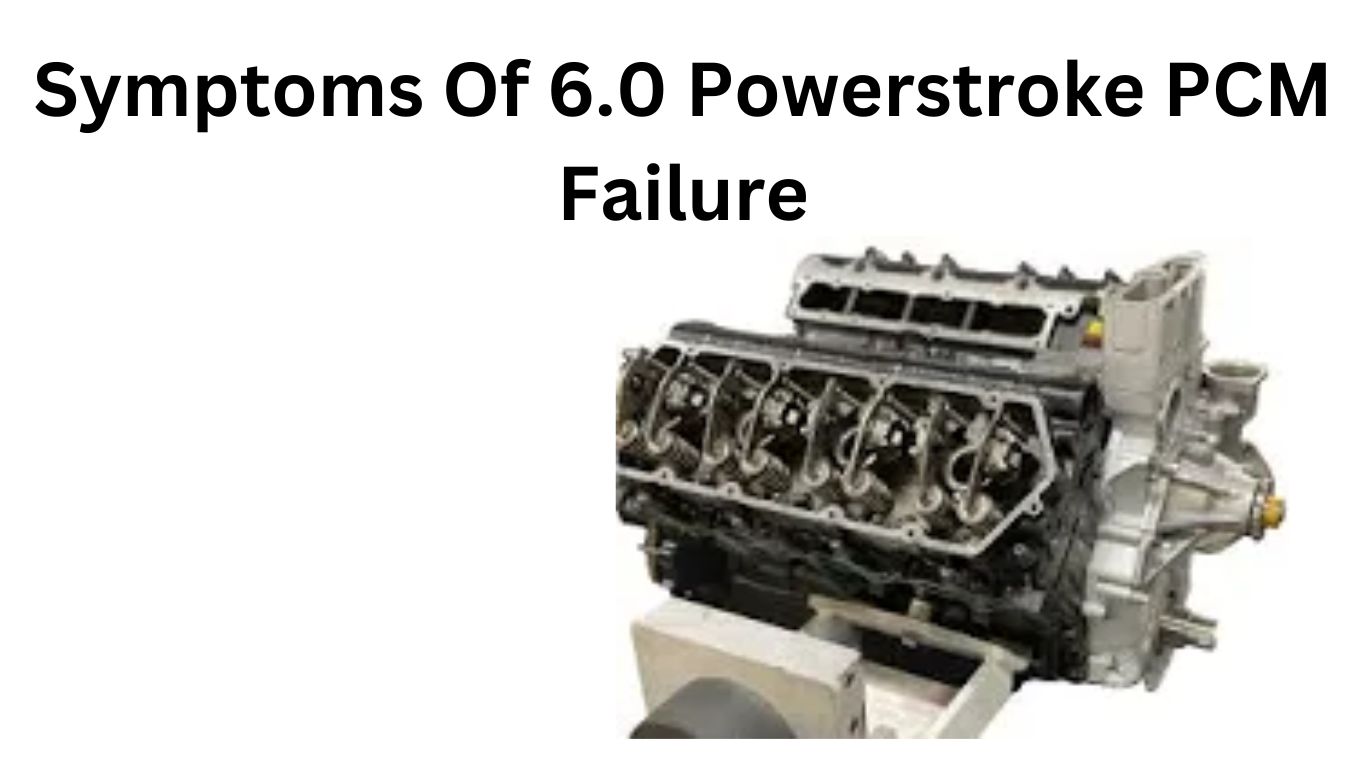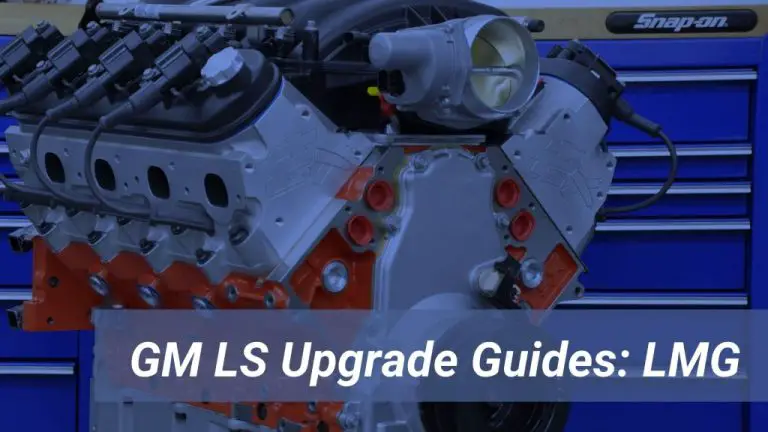Symptoms Of 6.0 Powerstroke PCM Failure (Detailed Guide)
If you own a 6.0 Powerstroke diesel engine, it’s essential to be aware of potential issues that may arise over time. One critical component that can cause significant problems is the Powertrain Control Module (PCM). The PCM acts as the brain of your vehicle, responsible for monitoring and controlling various engine functions. When it malfunctions or fails, it can lead to a host of issues and adversely affect the performance of your 6.0 Powerstroke.
In this comprehensive guide, we will explore the symptoms of PCM failure in a 6.0 Powerstroke and help you recognize the warning signs. Identifying these symptoms early on can save you from costly repairs and prevent further damage to your engine.
From erratic engine behavior to transmission issues and even a complete loss of power, PCM failure can manifest in various ways. By familiarizing yourself with these symptoms, you’ll be better equipped to diagnose potential PCM problems and take appropriate action.
Whether you’re a seasoned diesel enthusiast or a first-time 6.0 Powerstroke owner, this guide will provide you with valuable insights into the signs of PCM failure and empower you to address any issues promptly.
Let’s dive into the symptoms of 6.0 Powerstroke PCM failure and ensure your engine remains in optimal condition.
What is the next step recommended after checking normal issues without success?
After checking normal issues without success, the next recommended step is to utilize a quality scanner operated by an individual who is proficient in its use. Based on the description provided, it is likely that the issue is related to an electrical problem. Performing a buzz test, as was suggested with the Modus tool, would greatly aid in diagnosing the problem further.
6.0 Powerstroke PCM Failure Symptoms
The Powertrain Control Module (PCM) plays a crucial role in the operation of your 6.0 Powerstroke diesel engine. When the PCM begins to fail, it can lead to a range of noticeable symptoms that indicate underlying issues. Here are some common symptoms of 6.0 Powerstroke PCM failure to be aware of:
1. Engine Misfires
If you experience frequent engine misfires or notice a rough running engine, it could be a sign of PCM failure. The PCM controls the fuel injectors and ignition timing, and a malfunctioning PCM may not deliver the correct signals, resulting in misfires.
2. Poor Performance
A failing PCM can cause a significant drop in engine performance. You may notice a decrease in power, acceleration, and overall responsiveness of your 6.0 Powerstroke. This can manifest as sluggishness or difficulty in reaching higher speeds.
3. Stalling or Starting Issues
A malfunctioning PCM can lead to stalling or difficulty starting the engine. You may experience intermittent stalling while driving, or the engine may fail to start altogether. These issues can be frustrating and potentially dangerous, especially in critical situations.
4. Transmission Problems
The PCM is responsible for controlling the transmission in your 6.0 Powerstroke. PCM failure can result in erratic shifting, delayed gear engagement, or even complete transmission failure. If you notice any unusual transmission behavior, it’s important to have the PCM checked.
5. Warning Lights
A failing PCM can trigger various warning lights on your vehicle’s dashboard, such as the Check Engine Light, ABS Light, or Transmission Light. These lights serve as indicators of underlying issues and should not be ignored.
6. Loss of Fuel Efficiency
A malfunctioning PCM can cause a decrease in fuel efficiency. If you notice a significant drop in miles per gallon or find yourself refueling more frequently, it could be attributed to PCM failure.
Being attentive to these symptoms and addressing PCM issues promptly can help prevent further damage to your 6.0 Powerstroke engine and ensure its optimal performance and longevity.
What To Do When You Detect A Bad 6.0 Powerstroke PCM?
Discovering a bad Powertrain Control Module (PCM) in your 6.0 Powerstroke engine can be concerning, but taking the right steps can help resolve the issue efficiently. Here’s what you should do when you detect a bad 6.0 Powerstroke PCM:
Diagnostic Scan
When you notice symptoms indicative of a bad PCM, the first step is to perform a diagnostic scan using a compatible scan tool. This will retrieve error codes and provide valuable information about the specific issue. Note down the trouble codes for reference during the repair process.
Seek Professional Assistance
Unless you possess advanced automotive diagnostic skills, it’s advisable to consult a qualified mechanic or technician with experience working on 6.0 Powerstroke engines. They will have the expertise and specialized equipment to accurately diagnose the PCM problem and provide appropriate solutions.
PCM Replacement
In most cases, a bad PCM will require replacement. Ensure that the replacement PCM is compatible with your 6.0 Powerstroke model and has been programmed with the correct firmware. This step is crucial to ensure proper communication and functionality with your vehicle’s other systems.
Reprogramming
After installing the new PCM, it needs to be programmed to match your vehicle’s specific configuration. This programming process may require specialized software and equipment that are typically available at authorized service centers or professional automotive repair facilities.
System Testing
Once the new PCM is installed and programmed, comprehensive system testing should be conducted to ensure proper functionality. This includes verifying that the symptoms have been resolved, all error codes have been cleared, and the engine is running smoothly.
Regular Maintenance
To prevent future PCM issues, it’s essential to follow the manufacturer’s recommended maintenance schedule for your 6.0 Powerstroke. Regular inspections, servicing, and addressing any underlying issues promptly can help avoid PCM failures and prolong the lifespan of your engine.
Is Replacing A Bad 6.0 Powerstroke PCM Expensive?
The cost of replacing a bad Powertrain Control Module (PCM) in a 6.0 Powerstroke can vary depending on several factors. Here are some factors that can influence the cost:
- OEM vs. Aftermarket: The cost of a replacement PCM can vary depending on whether you choose an Original Equipment Manufacturer (OEM) PCM or an aftermarket alternative. OEM parts are typically more expensive, but they offer a higher level of compatibility and reliability. Aftermarket options may be more affordable but may come with varying levels of quality and performance.
- Labor Costs: The labor costs associated with PCM replacement can vary depending on the mechanic or repair shop you choose. Labor rates can differ based on geographical location and the expertise of the technician. Additionally, if the replacement PCM requires programming or reprogramming, there may be additional labor charges.
- Warranty: Some replacement PCMs come with warranties, which can affect the overall cost. Warranties can provide peace of mind and potentially save you from additional expenses if any issues arise with the new PCM.
- Additional Repairs: In some cases, a bad PCM may be a symptom of an underlying issue. If the mechanic identifies other related problems during the diagnosis, such as wiring faults or sensor failures, the overall repair cost can increase.
How Often Should You Service The 6.0 Powerstroke PCM?
Servicing the Powertrain Control Module (PCM) in a 6.0 Powerstroke engine typically does not require regular maintenance. The PCM is a vital component responsible for controlling various engine functions, and it is designed to operate reliably for an extended period.
However, it is important to follow the manufacturer’s recommended maintenance schedule for your 6.0 Powerstroke engine, which includes routine inspections and servicing. During these maintenance intervals, other components and systems of the vehicle are typically checked, and any necessary repairs or adjustments are made. While the PCM itself may not require specific servicing, regular maintenance helps ensure the overall health and performance of your engine.
Additionally, if you experience any symptoms or issues that indicate a potential problem with the PCM, such as engine misfires, poor performance, or warning lights, it is crucial to have it diagnosed and repaired promptly. Ignoring PCM-related issues can lead to further damage to the engine and potentially more costly repairs down the line.
While regular servicing of the PCM itself may not be necessary, following the manufacturer’s recommended maintenance schedule and promptly addressing any PCM-related issues are essential to maintain the optimal performance and reliability of your 6.0 Powerstroke engine.
7.3 Powerstroke PCM Failure Symptoms: When the Engine’s Brain Goes Bad
The Powertrain Control Module (PCM), also known as the Engine Control Unit (ECU), acts as the brain of your 7.3L Powerstroke engine. It manages various critical functions, ensuring smooth operation and optimal performance. A failing PCM can wreak havoc on your engine, causing a range of symptoms. Here’s what to watch out for:
Starting Issues:
- Engine Cranks But Won’t Start: This is a classic sign of a PCM failure. The PCM controls various aspects of engine startup, and if it malfunctions, it might not send the necessary signals to initiate the proper starting sequence.
- Rough Starts and Stalling: A failing PCM can disrupt fuel delivery and ignition timing, leading to rough starts or the engine stalling shortly after starting.
Performance Problems:
- Lack of Power and Acceleration: The PCM plays a crucial role in power delivery. If it fails, your 7.3L Powerstroke might feel sluggish and unresponsive when accelerating. You might also experience a decrease in towing capacity or uphill performance.
- Erratic Shifting (Automatic Transmission): The PCM communicates with the transmission control module to manage gear shifts. A failing PCM can disrupt this communication, leading to erratic shifting, delayed gear changes, or harsh shifting.
Engine Issues:
- Inconsistent Idle: The PCM helps regulate engine idle speed. A failing unit can cause the engine RPM to fluctuate or surge erratically at idle.
- Increased Fuel Consumption: PCM malfunctions can disrupt fuel delivery and engine efficiency, leading to a noticeable decrease in fuel economy.
Warning Signs:
- Check Engine Light: The check engine light is a broad indicator of various issues, but it can also illuminate due to a failing PCM. Don’t ignore this warning! Have the fault codes scanned by a qualified mechanic to pinpoint the exact problem.
- Inaccurate Instrument Cluster Readings: The PCM provides data to the instrument cluster. A failing PCM might cause erratic or inaccurate readings on your gauges, such as the speedometer or tachometer.
Additional Symptoms:
- Cruise Control Malfunction: The PCM plays a role in cruise control functionality. If it fails, your cruise control might not work properly or become inoperable.
Remember, these symptoms can also be caused by other issues. However, if you experience a combination of these problems, a failing PCM could be the culprit.
How can I troubleshoot my 2001 Ford F350 Super Duty with a 7.3L Powerstroke turbo that dies when revved at a certain RPM?
To troubleshoot a 2001 Ford F350 Super Duty with a 7.3L Powerstroke turbo that dies when revved at a certain RPM, you can follow these steps:
1. Start by disconnecting each sensor one at a time to identify any potential issues. Check the idle performance of the truck, and specifically observe at what RPM the engine dies.
2. If your truck dies when revved around 1200 – 1400 RPM, this could be due to an issue with the fuel system or engine control modules. Consider checking the Crankshaft Position Sensor (CMP) and the Inlet Pressure Regulator (IPR) fuel bowl pressure relief/return assembly.
3. Ensure that the batteries are fully charged and not causing any power supply issues that could lead to engine stalling.
4. Given that the truck drives fine once in gear, it’s possible that the issue lies within the Ignition Driver Module (IDM) or the Powertrain Control Module (PCM). These components could be malfunctioning, causing the engine to shut off at specific RPM levels.
5. To test the IDM and PCM, you may need specialized diagnostic tools. Consider consulting with a professional mechanic or using an OBD-II scanner to check for any error codes related to these modules.
6. Instead of directly swapping out components, it’s advisable to test them systematically to pinpoint the exact cause of the problem. This approach can help save time and money by avoiding unnecessary part replacements.
By methodically troubleshooting these potential culprits, you can identify and resolve the issue causing your Ford F350 Super Duty to stall when revved at a certain RPM.
How do I know if my 7.3 ICP is bad?
A faulty Injector Control Pressure (ICP) sensor in your 7.3L Powerstroke engine can cause a number of issues and negatively impact performance. Here’s how to identify the signs of a bad ICP sensor:
Warning Signs and Symptoms:
- Starting Issues: A failing ICP sensor can disrupt engine starting by sending incorrect signals to the PCM (Powertrain Control Module) regarding injector pressure. This can lead to difficulty starting, extended cranking times, or even complete failure to start.
- Rough Idle and Engine Performance: The ICP sensor plays a role in regulating fuel injection. If it malfunctions, it can cause a rough idle with erratic RPM fluctuations. You might also experience a lack of power, sluggish acceleration, and decreased towing capacity.
- Check Engine Light: The check engine light is a broad indicator, but it can also come on due to a faulty ICP sensor. Retrieving the fault codes stored by the PCM can provide more specific information about the problem.
- Black Smoke from Exhaust: In some cases, a bad ICP sensor can lead to excessive fuel delivery, resulting in incomplete combustion and black smoke coming out of the exhaust.
Additional Clues:
- No Change in Engine Operation When Disconnecting ICP Sensor: This is a risky diagnostic technique, but some mechanics might try disconnecting the ICP sensor while the engine is running. If the engine’s performance doesn’t change significantly, it might be a sign of a bad ICP sensor (although other issues could also be at fault). Disclaimer: Only attempt this with the guidance of a qualified mechanic, as there are potential risks involved.
Important Considerations:
- These symptoms can also be caused by other problems. A failing ICP sensor shares some symptoms with other potential issues in your 7.3L Powerstroke engine. A qualified mechanic can perform proper diagnosis to pinpoint the exact cause.
- Don’t ignore these signs! A faulty ICP sensor can lead to further problems if left unaddressed. Early detection and repair can save you money and prevent unnecessary wear and tear on your engine.
Solutions for a Bad ICP Sensor:
- ICP Sensor Replacement: The most common solution is replacing the ICP sensor with a new or high-quality remanufactured unit. This ensures accurate readings and proper fuel injection control.
- Electrical Connections: In some cases, the issue might be a faulty connection between the ICP sensor and the wiring harness. A mechanic can inspect the connection and address any corrosion or damage.
Consult a Qualified Mechanic:
Diagnosing and repairing a faulty ICP sensor requires proper knowledge and tools. It’s recommended to seek help from a qualified mechanic with experience working on 7.3L Powerstroke engines. They can accurately diagnose the problem, recommend the appropriate solution, and ensure your engine runs smoothly and efficiently once again.
What sensors can cause a 7.3 to not start?
Several sensors can contribute to a 7.3L Powerstroke engine not starting properly. Here are some of the common culprits:
- ICP (Injection Control Pressure) sensor: This sensor monitors the high-pressure oil delivered to the injectors. A faulty ICP sensor can send incorrect signals to the PCM (Powertrain Control Module) regarding injector pressure, disrupting the starting sequence.
- Crankshaft Position Sensor (CKP): The CKP sensor detects the position of the crankshaft and relays this information to the PCM. A malfunctioning CKP sensor can prevent the PCM from triggering spark (in gas engines) or fuel injection (in diesel engines) at the right moment, leading to starting issues.
- Camshaft Position Sensor (CMP): The CMP sensor works in conjunction with the CKP sensor to determine engine timing. A faulty CMP sensor can disrupt the timing of fuel injection or spark delivery, hindering the engine’s ability to start.
- IPR (Injection Pressure Regulator) sensor: The IPR sensor monitors and regulates the high-pressure oil going to the injectors. A failing IPR sensor can prevent the system from building sufficient pressure for proper fuel injection, making starting difficult.
- Fuel temperature sensor: While less common than the other sensors listed, a faulty fuel temperature sensor can sometimes disrupt engine starting, especially in cold weather conditions. The PCM relies on accurate fuel temperature data to adjust fuel injection accordingly.
Additional Considerations:
- These are not the only possibilities. Other factors, such as a failing glow plug system (in cold climates), a bad starter motor, or battery issues, can also prevent a 7.3L Powerstroke from starting.
- Diagnosis is key. If you suspect a sensor issue is hindering your engine’s starting ability, consult a qualified mechanic. They can diagnose the problem through a combination of code scanning, testing the specific sensors, and examining other possible causes.
By understanding these potential sensor failures and seeking professional help for diagnosis and repair, you can ensure your 7.3L Powerstroke starts reliably and performs at its best.
What is the most common problem with the 7.3 power stroke?
Determining the most common problem with a 7.3L Powerstroke engine can be challenging because it depends on several factors, such as:
- Mileage: As engines accumulate miles, certain parts are more prone to wear and tear. For high mileage engines, injector issues, glow plug issues, and HPFP (high-pressure fuel pump) failures might be more frequent.
- Maintenance history: Regular maintenance is crucial for preventing problems and extending the lifespan of engine components. Neglected engines might experience a wider range of issues due to lack of servicing.
- Driving habits: Constantly towing heavy loads or driving under extreme conditions can put extra stress on the engine, potentially leading to problems like turbocharger wear or head gasket failures.
However, based on information from mechanics and forums, some common problems reported with the 7.3L Powerstroke include:
- Cam Position Sensor (CPS) Failure: The CPS is a critical sensor that monitors camshaft position. A failing CPS can disrupt engine timing and lead to starting issues, rough idling, and decreased performance.
- Injector Issues: Over time, injectors can become clogged or faulty, causing a variety of problems like decreased power, rough idle, black smoke from the exhaust, and poor fuel economy.
- Glow Plug Issues: Especially in cold climates, glow plugs play a vital role in aiding engine startup. Faulty glow plugs can make starting difficult, particularly during winter.
- High-Pressure Fuel Pump (HPFP) Failure: The HPFP delivers fuel at high pressure for optimal combustion. A failing HPFP can lead to starting problems, lack of power, and decreased fuel economy.
- Turbocharger Issues: The turbocharger increases engine power and efficiency. Wear and tear, or a clogged turbocharger van can lead to decreased power output and potential boost leaks.
Remember, this is not an exhaustive list. Many other issues can affect a 7.3L Powerstroke engine. If you’re experiencing any performance problems with your 7.3L Powerstroke, consulting a qualified mechanic familiar with these engines is recommended for accurate diagnosis and repair.
FAQ:
Q: What are the common symptoms of 6.0 Powerstroke PCM failure?
A: Common symptoms of 6.0 Powerstroke PCM failure include engine misfires, poor performance, stalling or starting issues, transmission problems, illuminated warning lights on the dashboard, and a decrease in fuel efficiency.
Q: How can I diagnose a bad PCM in my 6.0 Powerstroke?
A: To diagnose a bad PCM, you can perform a diagnostic scan using a compatible scan tool. This will retrieve error codes that can provide valuable information about the specific issue. If you are not familiar with automotive diagnostics, it is recommended to seek the assistance of a qualified mechanic or technician.
Q: Can I replace the PCM in my 6.0 Powerstroke myself?
A: Replacing the PCM in a 6.0 Powerstroke usually requires specialized knowledge and equipment. It is recommended to have the replacement and programming performed by a qualified professional. They will have the expertise to ensure proper compatibility and functionality.
Q: How much does it cost to replace a bad PCM in a 6.0 Powerstroke?
A: The cost of replacing a bad PCM in a 6.0 Powerstroke can vary depending on factors such as the type of PCM (OEM or aftermarket), labor costs, and any additional repairs needed. It is advisable to obtain estimates from reputable repair shops or dealerships to get an accurate idea of the cost for your specific situation.
Q: Can a bad PCM cause other issues in my 6.0 Powerstroke?
A: Yes, a bad PCM can cause a range of issues in your 6.0 Powerstroke, including engine misfires, poor performance, transmission problems, starting or stalling issues, and decreased fuel efficiency. It is important to address PCM-related issues promptly to prevent further damage to the engine.
Q: How often should I service the PCM in my 6.0 Powerstroke?
A: The PCM in a 6.0 Powerstroke typically does not require regular servicing. However, it is crucial to follow the manufacturer’s recommended maintenance schedule for your engine, which includes routine inspections and servicing of other components. If you experience any PCM-related symptoms or issues, it is recommended to have it diagnosed and repaired promptly.






